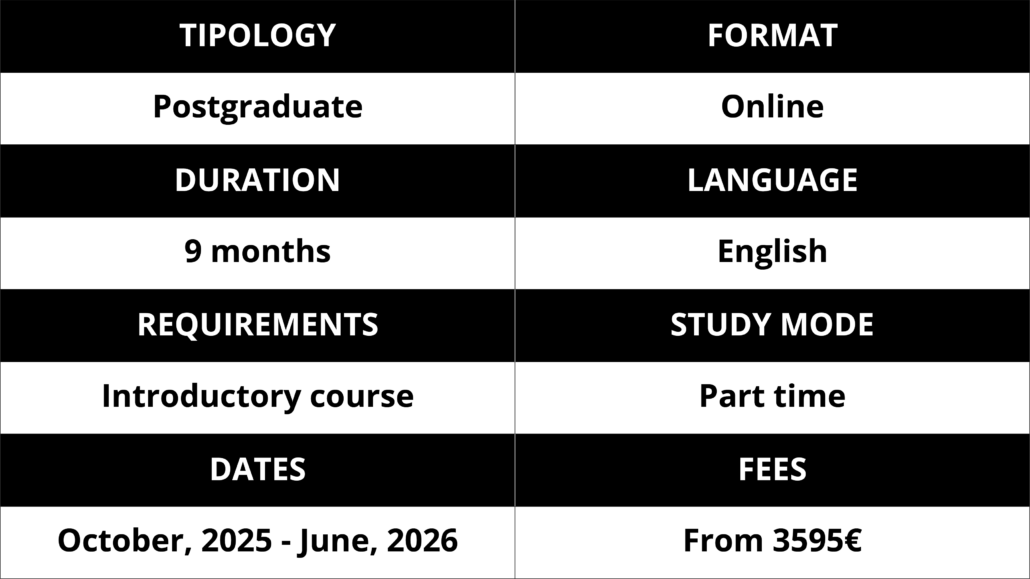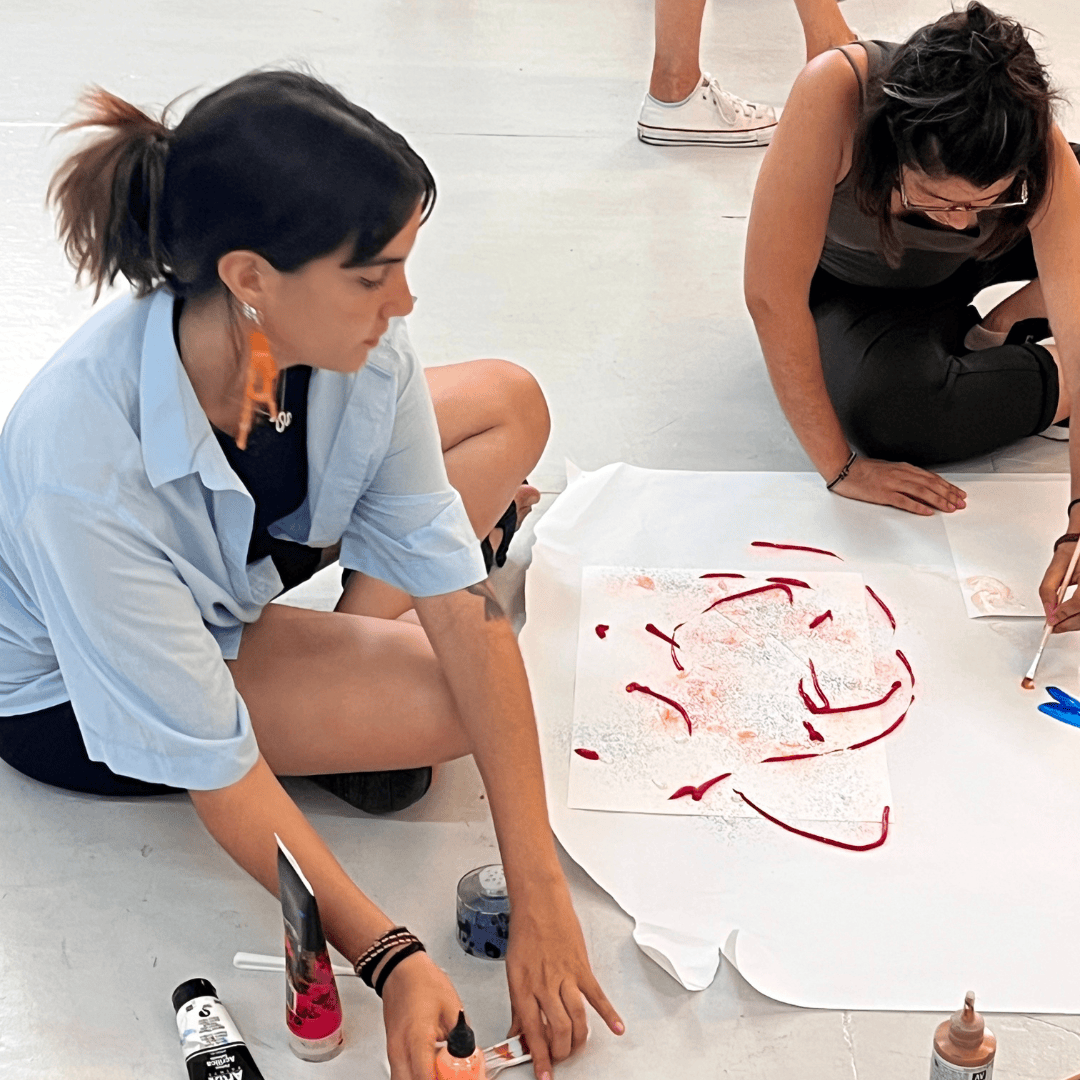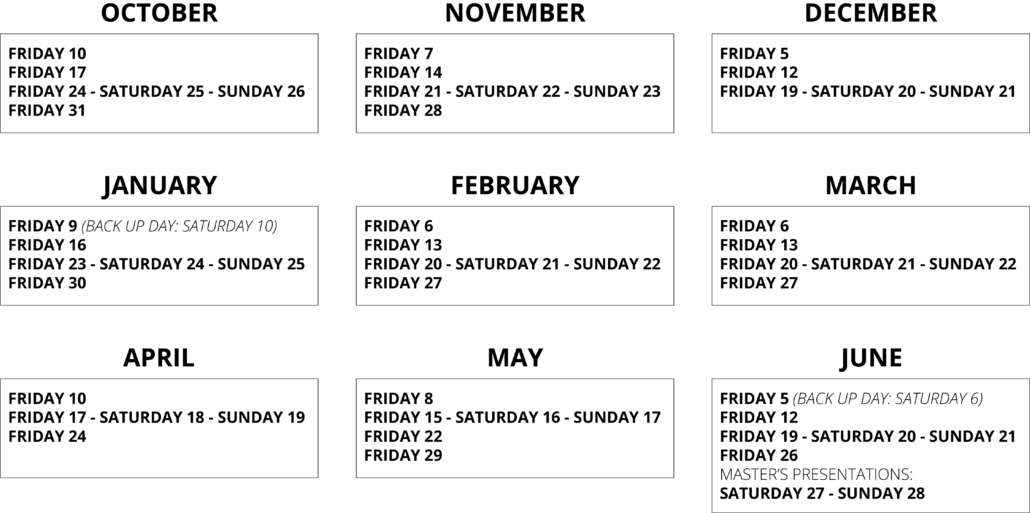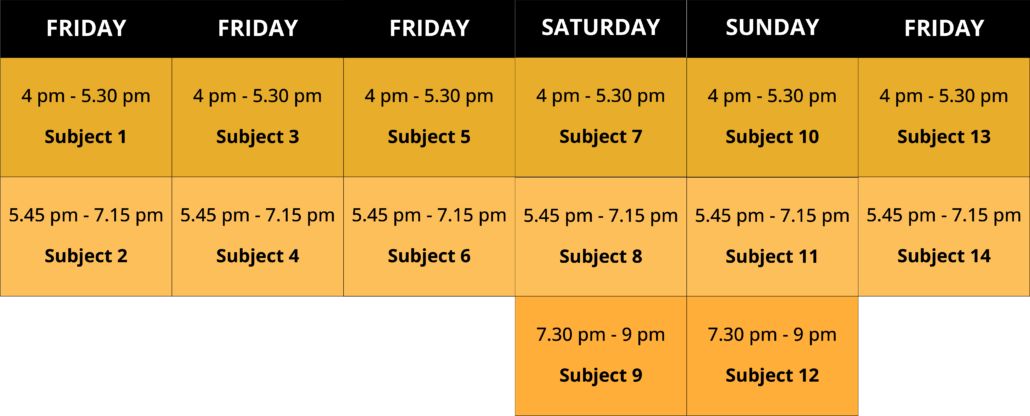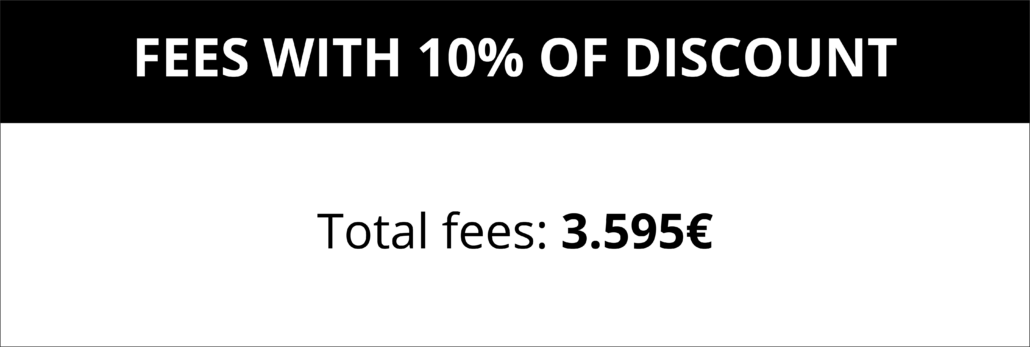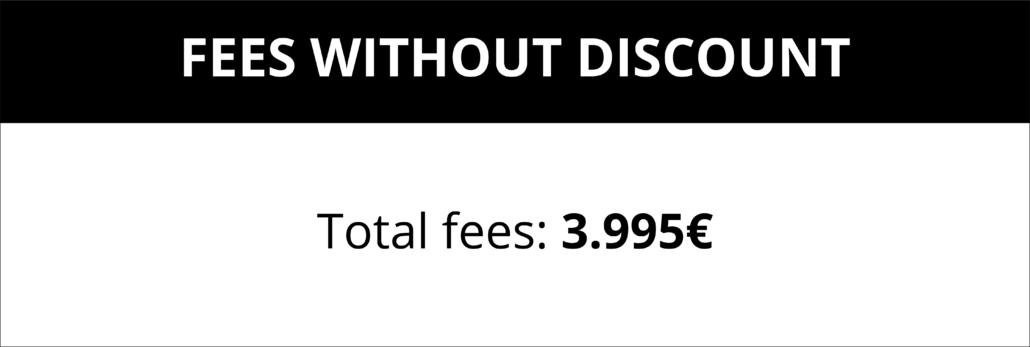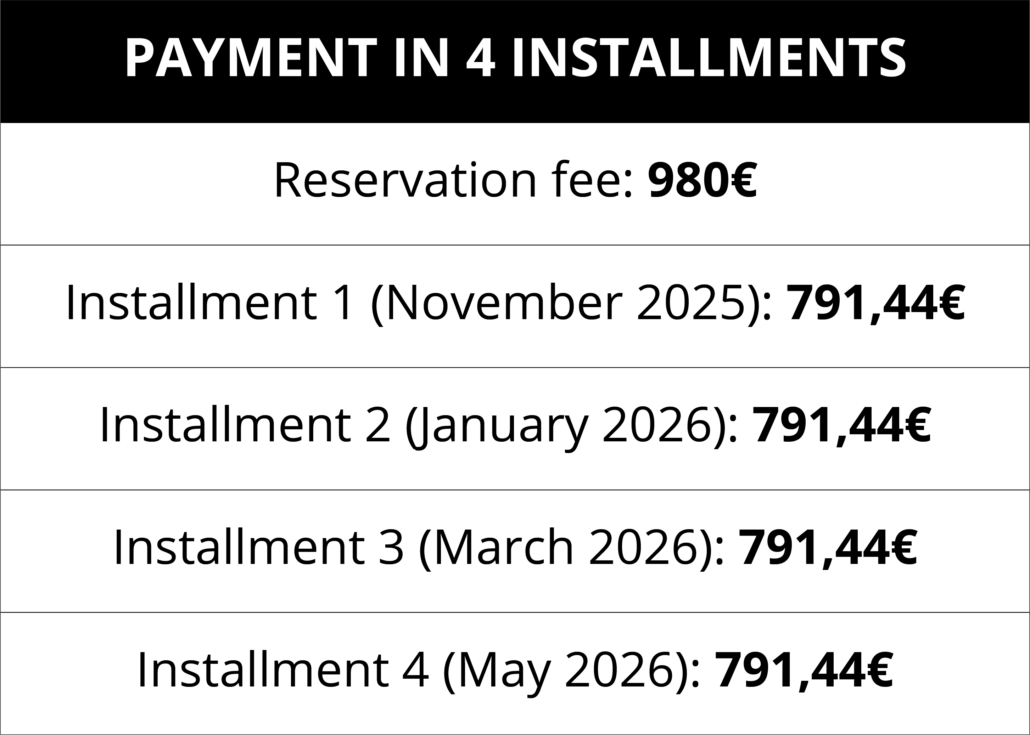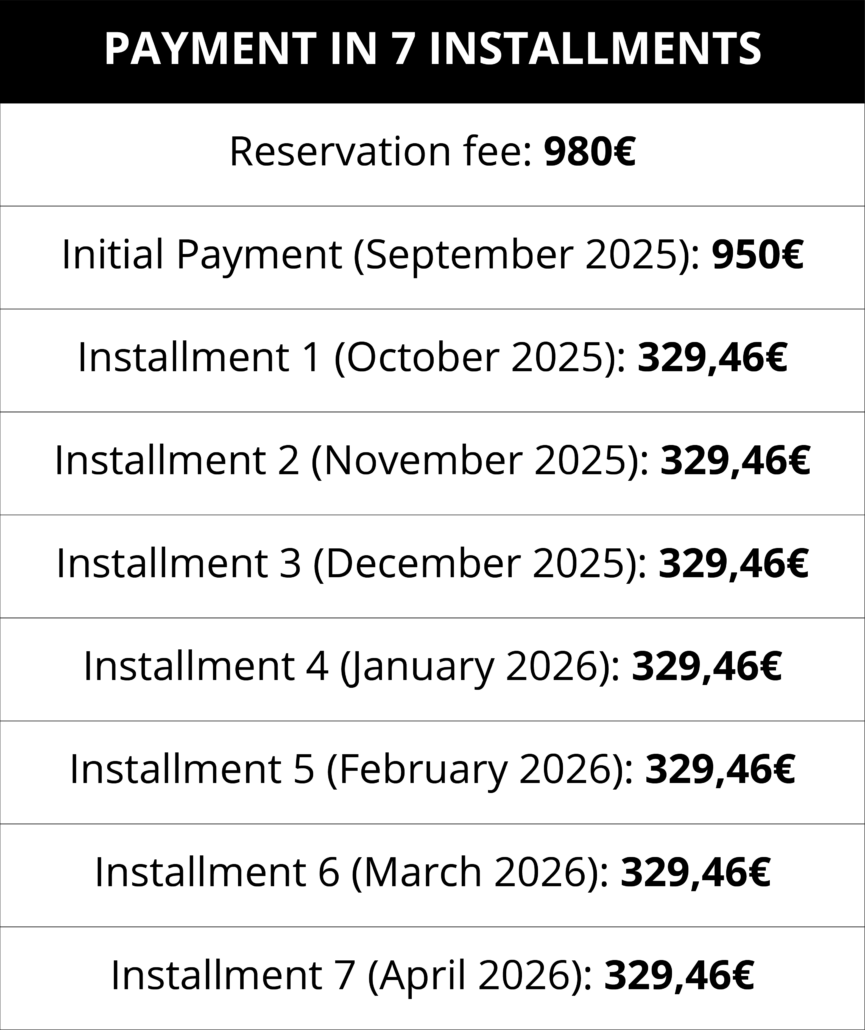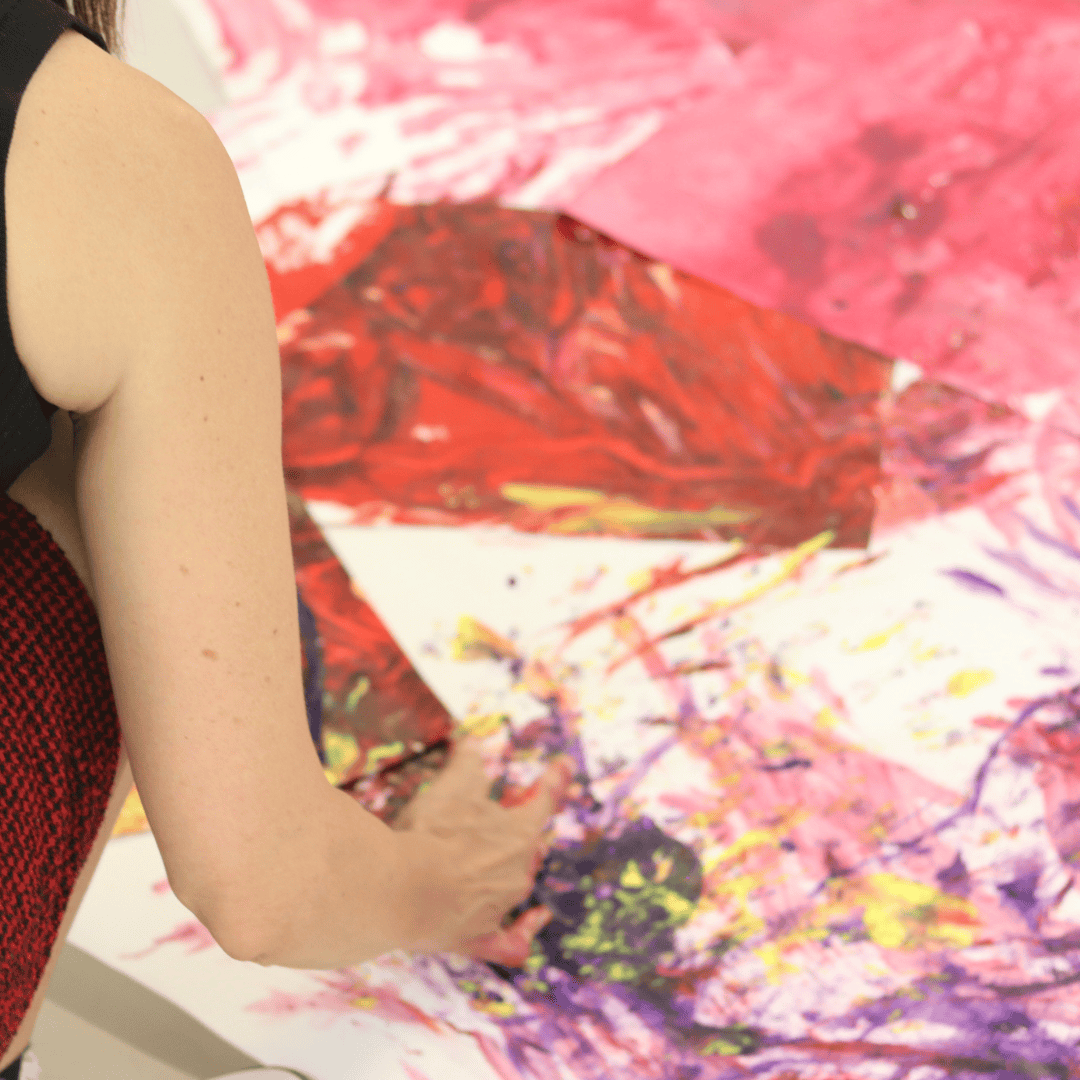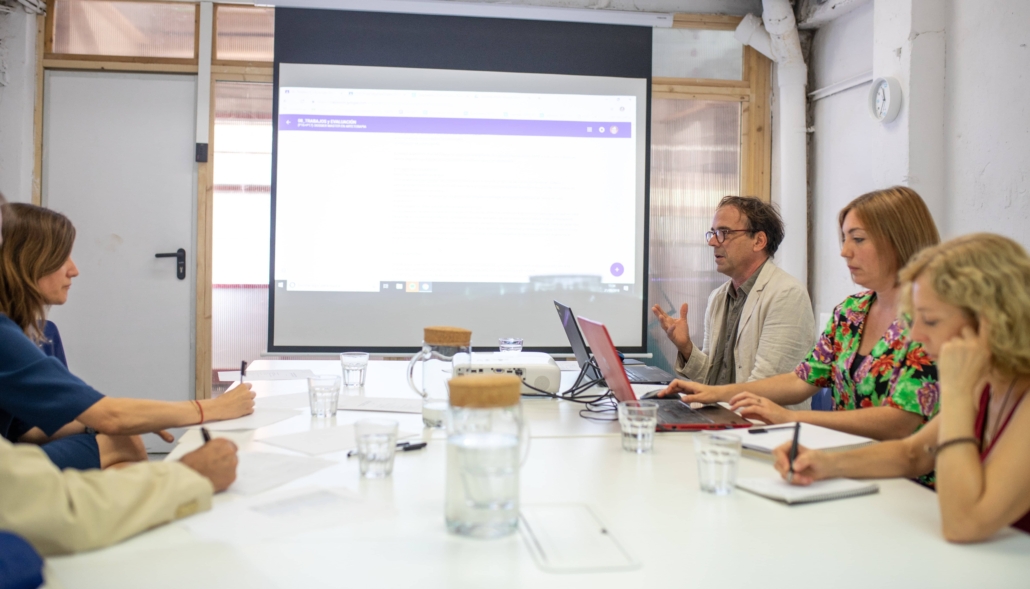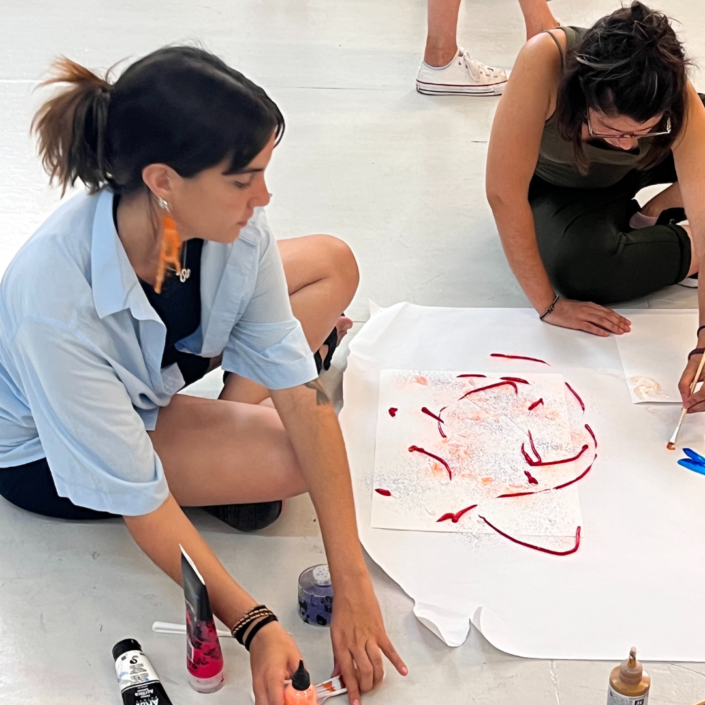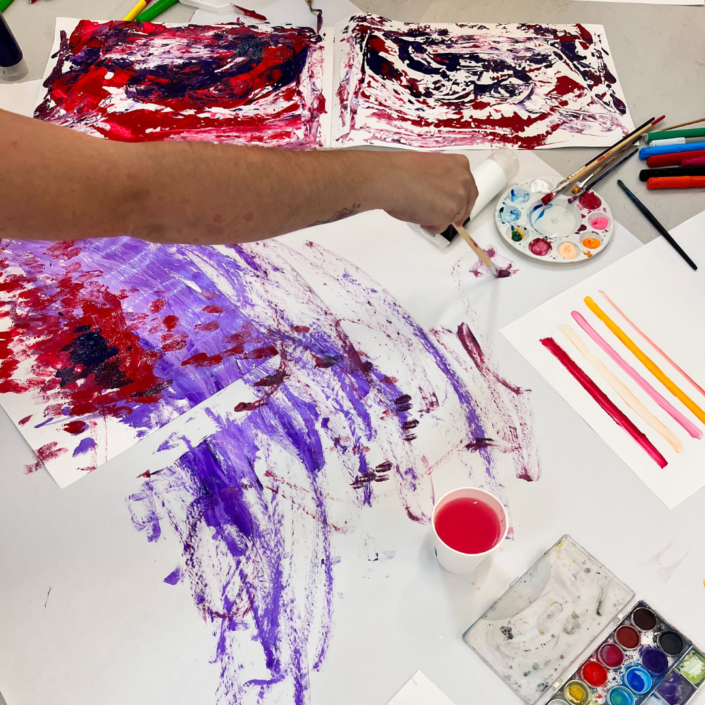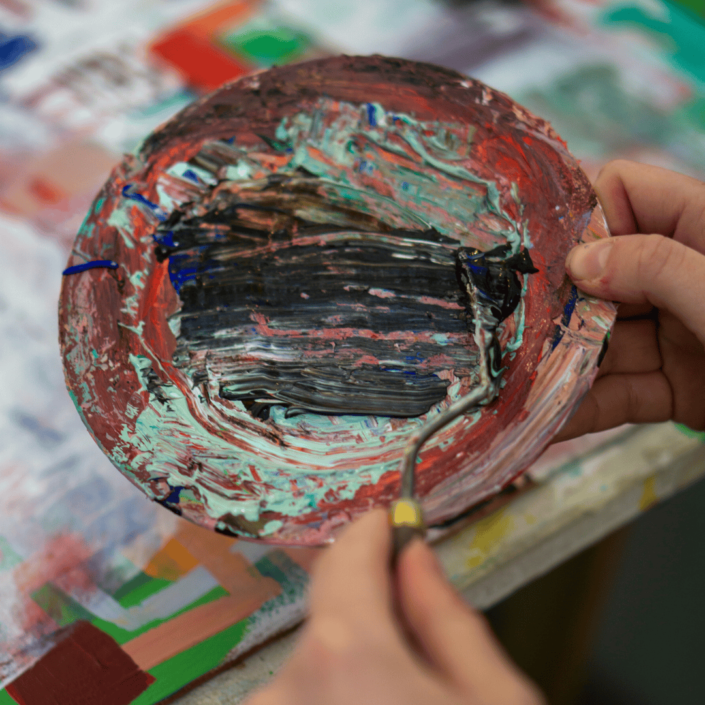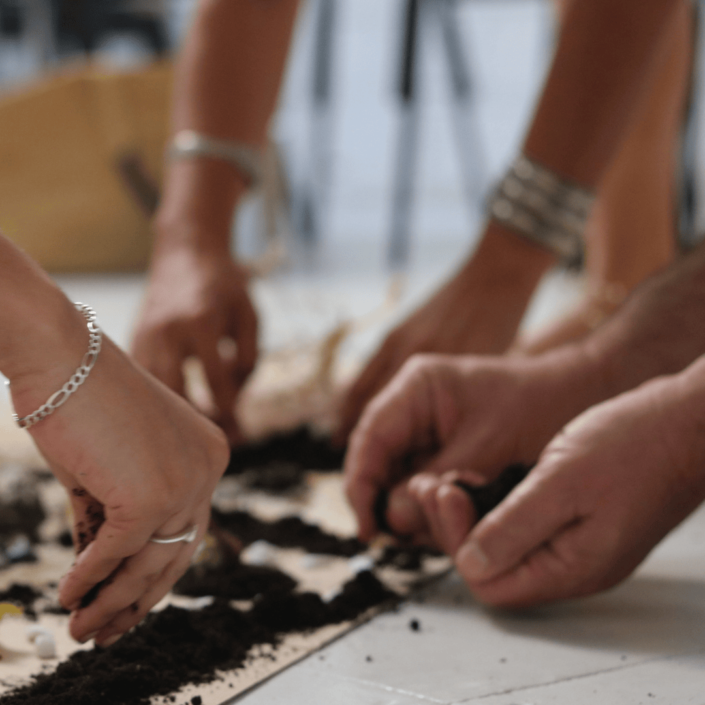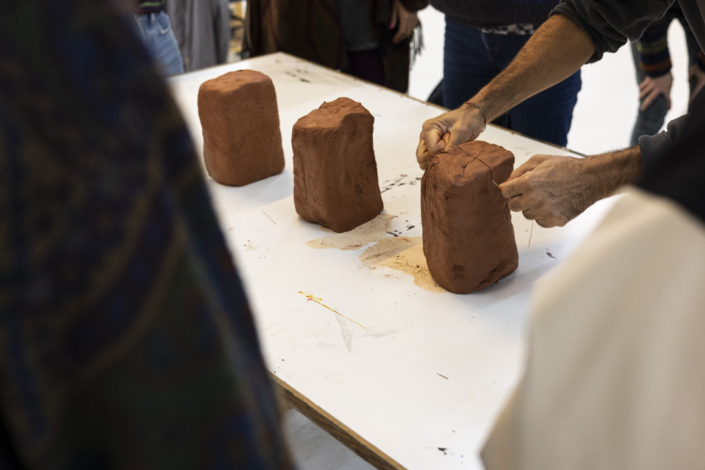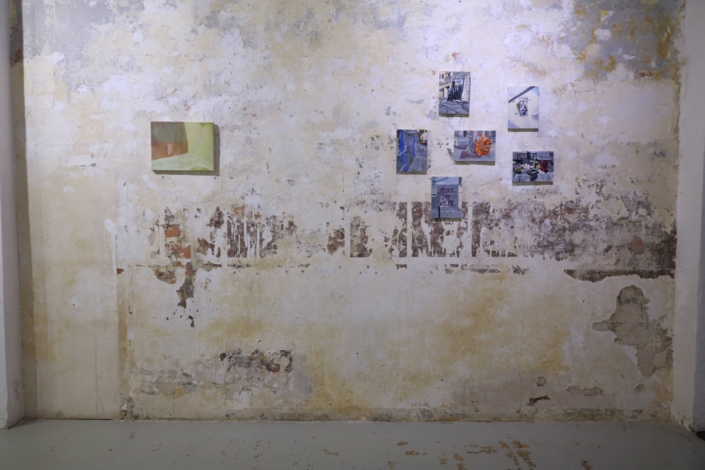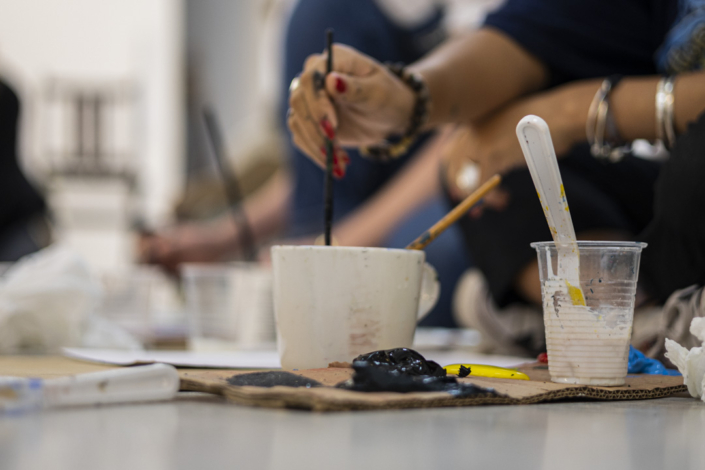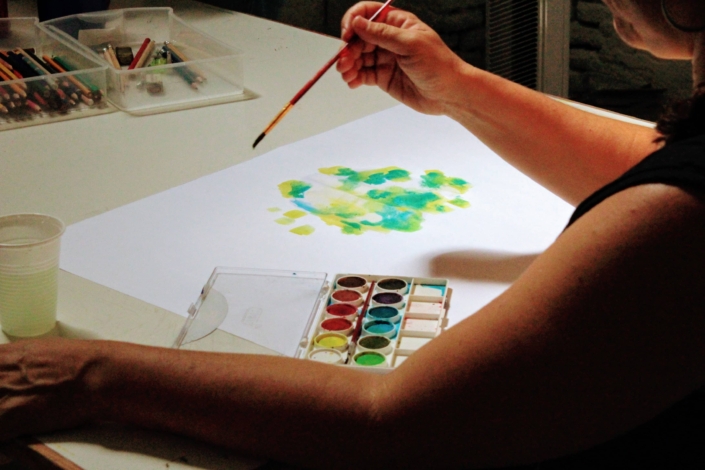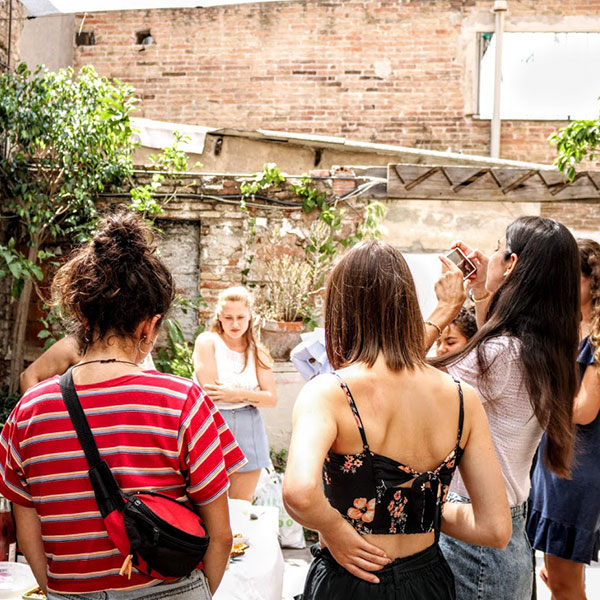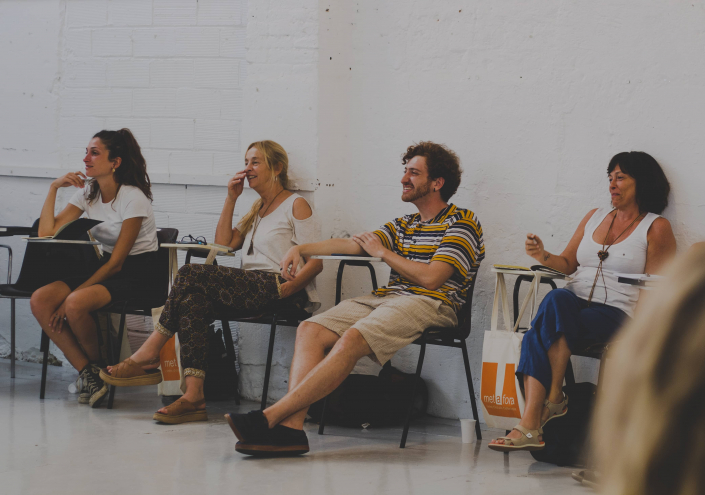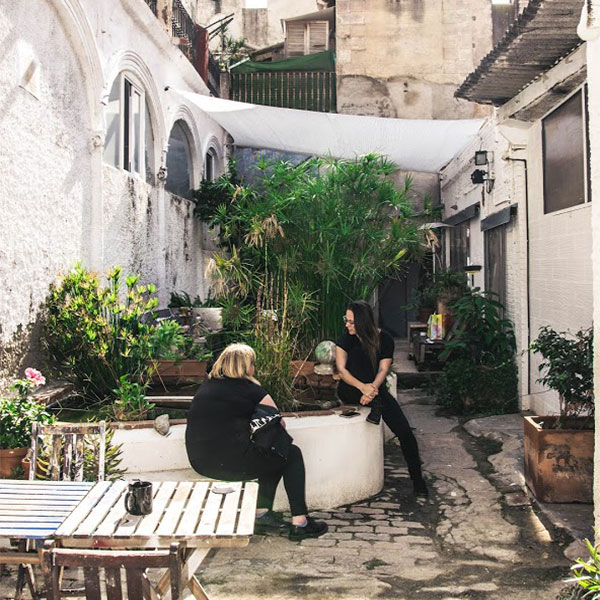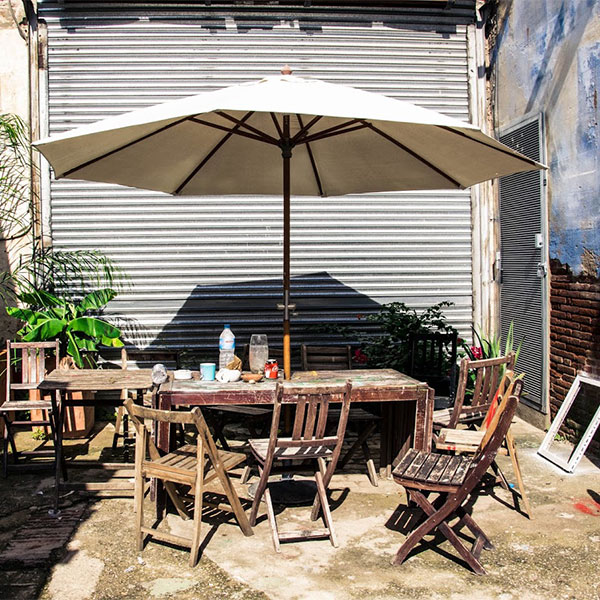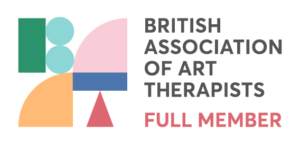WHY CHOOSE METÀFORA?
ONLINE
ACCESSIBILITY
The online format allows students from anywhere in the world to enroll. Schedules are designed to accommodate both European and American time zones.
IN-DEPTH
TRAINING
A nine-month, part-time program combining theory, practical exercises and case studies to deepen your knowledge of art therapy.
INTERNATIONAL
COMMUNITY
Join a diverse group of students from around the world and learn from experienced art therapists in a dynamic and interactive environment.
A KEY STEP IN
YOUR TRAINING
This postgraduate in art therapy is the second level of Metàfora’s full art therapy training and serves as the first year of the Master’s in Art Therapy.
COURSE DETAILS
Metàfora’s Postgraduate Diploma in Art Therapy and Community Art is a comprehensive, part-time online program designed for those looking to deepen their understanding of art therapy. Over nine months of immersive study, you will explore how artistic creation can be used in therapeutic and community settings, developing essential skills for professional practice.
This postgraduate in art therapy is the second level of Metàfora’s complete art therapy training and the first year of the Master’s in Art Therapy. To enroll, participants must have completed one of Metàfora’s Introductory Courses in Art Therapy.
The program is ideal for professionals in education, healthcare, social work and the arts who want to integrate art therapy into their careers, as well as for individuals seeking personal and creative growth. Through live online classes, practical projects and group dynamics, students engage with an international community of learners while receiving guidance from experienced art therapists.
The program is conducted entirely online, making it accessible to students worldwide. Classes are scheduled to accommodate various time zones, facilitating participation from both European and American students.
Benefit from Metàfora’s two decades of experience in art therapy education. Engage in a dynamic and enriching environment that fosters both personal and professional growth.
Embark on this transformative journey with Metàfora’s Postgraduate Diploma in Art Therapy and Community Art, and discover the profound impact of art as a therapeutic tool.
With over two decades of experience, Metàfora is a leader in art therapy education, providing a structured pathway toward professionalization. This postgraduate in art therapy is a crucial step for those aspiring to become art therapists and make a meaningful impact in the field.
WHAT YOU WILL LEARN IN THIS ART THERAPY COURSE
Core Foundations of Art Therapy. Understand the key principles and history of art therapy. Explore different theoretical approaches and methodologies.
Art Therapy in Community and Clinical Settings. Learn how to apply art therapy in diverse contexts: education, healthcare, and social work. Discover how creativity fosters social inclusion and well-being.
Creative Processes and Expressive Techniques. Experiment with a variety of artistic media for therapeutic purposes. Develop hands-on experience with creative techniques used in art therapy.
Group Dynamics and Facilitation Skills. Gain insights into working with individuals and groups in art therapy settings. Practice leading sessions and understanding group processes.
Case Studies and Practical Applications. Analyze real-life case studies from professional art therapists. Explore intervention strategies for different populations and challenges.
Pathway to Professionalization. Prepare for further studies in art therapy, including Metàfora’s Master’s in Art Therapy. Gain a strong foundation for professional development in the field.
PROGRAM
MODULE 1: ART THERAPY (12 ECTS)
ART THERAPY EXPERIENCE GROUP (13,5 hours)
The objective of experiential art therapy groups is to explore the dynamics of a group in which images and art objects are produced. Guided by a professional art therapist, the participants experience first-hand some of the situations that give name to the different theoretical concepts of art therapy. The role of the facilitator of the group is to accompany the participants through artistic expression, observation and dialogue, in order to explore and reveal the dynamics of group interactions.
OBSERVATION AND EXPRESSION TECHNIQUES (13,5 hours)
The purpose of this subject is to approach experientially three important aspects of psychotherapeutic work: observation, reflection and communication. Thus, the objective of the course is to acquire skills in the observation of artistic situations or processes, reflect on what is observed (whether about oneself, about the other or a group situation) and explore different artistic media as ways to communicate our experience to others.
In each of the sessions, the individual work created at home during the month and its creation process are shared in the group. The composition of the groups with their leaders are the same as in experiential art therapy groups.
INDIVIDUAL TUTORIALS (1,5 hours)
A tutor is assigned to accompany the student throughout their training, with whom they will meet periodically, both in individual and group sessions, to share concerns and experiences that arise in the learning process.
ROLE PLAY AND GROUP TUTORIALS (13,5 hours)
The Role Play sessions and group tutorials are developed in groups with the course tutors. In these sessions, students test ways of resolving situations that have to do with the practice of art therapy and the formative experience.
THEORY OF ART THERAPY (13,5 hours)
This is an introduction to different authors and ways of working that characterize our profession. The theory of art therapy is explored through its history, its theoretical framework and other aspects that shape the discipline, providing examples of practice and the various intervention modalities, with special emphasis on the Relational model and the application of Mentalization in Art Therapy.
We will delve into the various aspects that make up this discipline and its variety of applications and possibilities within the proposed theoretical framework. The knowledge of the theoretical contents, the development of the capacity for reflection, and bibliographical reading are essential for the development of the profession.
Contents:
● art and therapy
● art therapy models
● history and precedents of art therapy
● the setting and framing according to the collective
● art materials and media
● relational art therapy framework
● the link and epistemic trust
● therapeutic triangle and potential space
● art as play
● object and process
● images and supervision
● art therapy and groups
METHODOLOGY (3 hours)
This subject offers students the knowledge and resources necessary for the proper development of the academic work of the course.
Contents:
- Steps of the writing process: brainstorming, drafting, revising, proofreading, and publishing
- Introduction to the APA regulations, 7th edition: structure of articles, citations and references.
CLINICAL CASE PRESENTATIONS (7,5 hours)
These sessions are dedicated to presenting the clinical work carried out by professional art therapists in different centers and groups. In these meetings, the professional art therapist presents in detail the art therapy processes carried out with different individual cases or group experiences.
ART THERAPY WORKSHOPS (8 hours)
Like case presentations, workshops are an opportunity to learn about the various fields in which art therapy is applied, to expand resources, and to experiment with different artistic proposals.
The invited art therapist provides a theoretical introduction about a specific group and then invites the students to experience and discuss the creative dynamics proposed.
MODULE 2: ART (8 ECTS)
PRESENTATIONS OF THE ART MAKING PROCESS (13,5 hours)
In the individual presentations of the art making process, each student will have the opportunity to share how they apply their creative sensibility in their daily life, what their influences are, and their artistic or creative production. This will give the opportunity to discuss the visual language, the reading of images and the creative processes.
CONTEMPORARY ART STRATEGIES (4,5 hours)
At the beginning of the 20th century, the art scene experienced an unprecedented expansion through the so-called ‘avant-garde movements’. The laws that governed artistic practices up to now were dissolved in favor of a freedom that opened up perspectives and the range of possibilities. Contemporary art, heir to this revolution, continues to break schemes and enter unsuspected terrain that forces the expansion of aesthetic and intellectual horizons. In this theoretical course we will review some works of art to analyze the different strategies used in recent visual arts.
ARTISTIC PRACTICE
It is essential that students maintain a continuous artistic practice. A minimum weekly dedication is recommended for the development of personal creative processes, promoting the development of artistic identity and as a form of self-care, taking into account that this practice does not include the monthly tasks of the TOE group, nor the proposals of the artistic workshops.
ARTISTIC WORKSHOPS
This subject aims to further connect the student with contemporary art by exploring theoretical, technical, material and creative process aspects. Throughout the course, various professionals from the current art scene lead these theoretical-experiential workshops.
MODULE 3: PSYCHOLOGY (6 ECTS)
DEVELOPMENTAL PSYCHOLOGY (13,5 hours)
Developmental psychology deals with the study of the biopsychosocial changes that we experience throughout our lives. This course provides the theoretical foundations of human development, defines the external and internal variables involved, while delimiting those critical periods in the evolutionary process. In addition, the possible relationships between the mental functioning of the individual, the creation process and personal expression are studied.
Contents:
● childhood and the formation of the psyche
● attachment, maternal and paternal roles
● adolescence and changes in the psyche
● identity, grief and reintegration to the world
● adulthood and mental development
● forms of relationship and appearance of crisis
● middle age and moments of transition
● parenthood, family and socio-cultural context
● maturity and mental development
● death and mourning
● creative capacity, symbolic function and mental images
● drawing and play throughout the life cycle
INTRODUCTION TO PSYCHOTHERAPY (13,5 hours)
The objective of this session is to introduce the student to the theory and techniques of psychoanalytic psychotherapy, offering an overview of the different schools of psychology, as well as analyzing the applicability of analytically oriented psychotherapy in different contexts.
Contents:
● introduction to psychotherapy
● culture, self and psychotherapy
● self-knowledge versus behavior change
● psychotherapy versus psychotherapeutic interventions
● characteristics of an effective therapist
● psychoanalysis then and now
● other therapeutic approaches
● psychotherapeutic relation and intercultural transference relation
● structure, process and therapeutic objectives
● The self, culture, and therapy modalities
INTRODUCTION TO THE THEORY OF ATTACHMENT (13,5 hours)
This course aims to invite students to delve into the world of early childhood and family and the development of creativity based on the concepts of attachment, mentalization and emotional regulation.
Contents:
● dimensions of creativity
● attachment theory
● attachment and emotional regulation
● mentalization
MODULE 4: PROJECTS (4 ECTS)
COMMUNITY ART PROJECTS (13,5 hours)
The projects module is an introduction to Community Art in which the development of the critical gaze of the student is encouraged. In it, they will gain theoretical and practical knowledge about the essential elements of Community Art, highlighting the close link that these projects have with the processes of social justice.
Through these sessions, students will learn the key concepts and tools that can help develop a project. In addition, the similarities and differences between art therapy and community art will be reviewed, highlighting how art therapy knowledge can benefit the facilitation of community processes.
SELF-MANAGED WORK GROUPS (13,5 hours)
In the self-managed group sessions, students will have the opportunity to work in small groups and experience the beginnings of building a project in a practical way. The process will emphasize three aspects: research, teamwork and project writing.
Investigating will generate collective knowledge; working in teams will provide the experience of networking; and writing a project to practice the theoretical elaboration of the material necessary to carry out a community art process.
COMMUNITY ART PRESENTATIONS (4,5 hours)
The purpose of these presentations is to showcase the practice of community art. These sessions are led by active professionals who present their interventions with various groups. While the training primarily focuses on the visual arts, organizations working with other art forms, such as theater or photography, will also be invited. This will allow us to explore the similarities and differences between these approaches.
Additionally, specialists in peace, global justice, and cooperation will be invited to present their work, providing a broader context for the role that community art projects currently occupy—or could potentially occupy—in society.
The structure of this course is subject to change up to three months before the start date.
CALENDAR & SCHEDULE (2025/26)
The course hours correspond to the Central European Time zone (CET) and are designed to facilitate access also for American students. During the course, students have to dedicate a minimum of 6 hours per week to complete coursework.
For certain classes, please prepare a series of art materials such as paper, crayons, pencils, paints, clay, modeling clay, fabrics, old magazines, bits and pieces, glue and anything likely to be used as art material of some kind.
NOTES:
The schedule indicated below is illustrative, the final programming is provided to the students at the beginning of the course.
Likewise, we inform that in Europe, two time changes occur each year. On the last Sunday of March, the clocks go forward one hour (2am becomes 3am). On the last Sunday of October, the clocks go back one hour (3am becomes 2pm).
FEES & DISCOUNT
10% DISCOUNT UNTIL THE 5TH OF SEPTEMBER!
Payment Options:
- Single Payment – Pay the full tuition upon admission and get a 10% discount if paid before Sept 5, 2025.
- Two Payments – Pay a 980€ reservation fee upon admission, then the remaining balance at least 30 days before the course starts.
- Installments – Available after paying the reservation fee. Choose between:
- 7 installments (+8% surcharge on the remaining balance).
- 4 installments (+5% surchargeon the remaining balance).
Limited spots – Your place is only guaranteed after payment of, at least, the reservation fee.
PAYMENT CONDITIONS
1. Reservation Fee
To apply for admission to the postgraduate diploma, students must complete the registration form. Once the form is received and reviewed by the academic team, the applicant will be contacted to proceed with the payment of the reservation fee or the total course fee.
The reservation fee is deducted from the total course fee upon admission and is essential to secure a place in the program.
The reservation fee is non-refundable under any circumstances, except if the application is rejected by Metàfora. In such cases, the fee will be refunded as promptly as possible.
If the student cancels or postpones their enrollment, the amount paid will remain valid for a maximum of 12 months from the start date of the originally enrolled course (see postponement conditions in the relevant section).
2. Payment of the Course Fee
If the student has reserved their place by paying the reservation fee, the remaining balance of the course fee must be paid no later than 30 days prior to the course start date.
Failure to make the payment within the stipulated time frame may result in the loss of the reserved place and the student being moved to the waiting list.
Once the course has started, no refunds will be issued (either partially or in full) if the student cancels or postpones their participation.
3. Payment in Installments
Students have the option to pay the remaining course fee in installments:
- 4 installments: subject to a 5% surcharge on the deferred amount.
- 7 installments: subject to an 8% surcharge on the deferred amount.
Installments must be paid between the 1st and 5th of each corresponding month, as per the payment schedule established by Metàfora.
In the event of late payment, a €20 surcharge will be applied for each week of delay.
4. Postponements and Course Changes
Students wishing to postpone their participation or transfer to another course must notify Metàfora in writing at least 6 weeks before the start of the originally enrolled course.
Conditions for postponement or change:
- The amount paid will remain valid for a maximum of 12 months from the start date of the original course.
- A €250 fee will be charged for processing the postponement, which will be added to any outstanding balance.
- If the new course has a higher cost, the student must pay the difference. If the cost is lower, the remaining balance will be retained as credit for future Metàfora activities, valid for an additional 12 months.
Requests for postponement or course changes are subject to availability and the admission requirements of the new course.
No refunds will be issued under any circumstances.
5. Interruptions in Participation
5.1 Due to Involuntary Causes
- In the case of an accident or illness, the student may request a voucher for the amount paid, valid for any Metàfora course within a 12-month period.
- A medical certificate must be provided to justify the cause.
5.2 Due to Voluntary Causes
If the student voluntarily interrupts their participation after the course has started:
- No refunds will be issued (either partially or in full).
- The student will lose their place and must fulfill their financial commitments. Under no circumstances does voluntarily interrupting the course exempt the student from the financial obligations they have contracted with the school.
- To resume studies in the future, the student will need to initiate a new enrollment and payment process.
6. Payment Methods
Payments can be made via:
- Credit card: online, by phone, or in person at Metàfora.
- Bank transfer: it is essential to include the student’s full name and the course name. Metàfora will not be held responsible for payments without this information.
- Cash: exclusively at Metàfora’s offices.
All international bank transfer fees must be borne by the sender. If any fees are incorrectly charged to Metàfora, the amount will be reclaimed from the student before the course begins.
Important Note
Submission of the registration form and payment of the corresponding fee constitute full acceptance of these terms.
ENROLLMENT
If you want to register for Metàfora’s Postgraduate Diploma in Art Therapy & Community Art, please fill in the form. Once it is submitted, you will be redirected to the application form where you will also find instructions for applying and how to fill it in. Once we receive your application, we will contact you.
If you have any questions during the registration process, you can call us at +34 93 330 00 89 or write us an email at at@metafora.org.
CREDITS, DIPLOMA & EVALUATION
The course is subject to attendance, work produced, timely hand-in and satisfactory grade on the final assignment. Upon completing The Postgraduate Diploma in Art Therapy & Community Art, the student receives a detailed transcript of the course. The transcript reflects hours (ECTS credits) and grades of all the classes which the student has attended. At the end of the course, the student receives a diploma/certificate. To obtain the certificate, it is essential to have attended a minimum of 80% of the classes.
Classes for which the student has been absent for more than 20% will not appear in the transcript.
At Metàfora we use an integral evaluation methodology to assess the progress of our students. This type of assessment combines qualitative and quantitative analysis.
The assessment or qualitative analysis is not quantifiable and refers to the nature and quality of learning, it takes into account the personal strengths and weaknesses of the student with a view to working as a future therapist. The assessment is continuous, it is carried out throughout the training: the student’s personal commitment to the course is assessed as well as her/his personal development, which implies her/his ability to generate trust in others, to create consistent emotional bonds and to sustain difficult emotions. The Master also values the skills acquired in clinical practice, such as the ability to create and sustain a therapeutic framework, the ability to integrate theory into practice and learning in supervision.
The academic or quantitative evaluation contemplates the percentage of attendance and assignments completed, as well as the evaluation of academic papers. It is carried out in two specific moments of the course.
The integral evaluation method consists of an average of the two aforementioned sections, sum of assessment and academic. It takes into account both personal skills and academic achievement and ultimately decides whether the student passes or fails the course.
The results of the integral evaluation can be PASS, FAIL and NOT PRESENTED.
TESTIMONIALS FROM FORMER STUDENTS
ABOUT METÀFORA
Our mission is to empower professionals and aspiring therapists from diverse backgrounds to harness the transformative power of art. Whether you’re a psychologist, psychotherapist, artist, social worker, nurse, teacher, occupational therapist, or medical professional, Metàfora offers a dynamic learning environment to expand your skill set and unlock the therapeutic potential of art.
At Metàfora, we believe in personalized education that fosters both personal and professional growth. Our diverse range of training programs empowers students to explore various art therapy approaches and techniques. Led by highly qualified experts, our curriculum delivers exceptional training and support.
Immerse yourself in Barcelona’s vibrant artistic heritage while acquiring world-class art therapy education.
Our commitment to innovation and student well-being has positioned Metàfora as a leading institution for those seeking to transform lives through the power of art.

